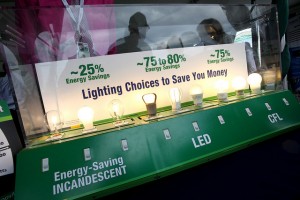How Efficient is Energy Efficiency?
The booming topic of today’s time, that has been repeatedly brought up and torn down, would be the discussion of the environment. Whether or not one believes global warming is true, the issues orbiting this subject involve energy efficiency and how the human race can prevent any more harm to the earth than we already have committed. Arik Levinson, guest speaker on Freakonomics Radio, is an environmental economist currently involved in writing an analysis on energy efficiency after working as a member of the Council of Economic Advisors under President Barack Obama. Levinson argues that while the focal point of the council surrounded energy efficiency, “We’re enacting a bunch of policies, patting ourselves on the back for achieving our climate goals, while the Earth continues to warm and carbon emission continue to increase” (Levinson). The problem with environmental issues branching into economic advisor’s hands is that the concept of making energy efficient products for cheaper costs results in a “rebound effect” in the consumer’s mind. The example given by the Freakonomics Radio host, is that if an individual has a solar paneled house and drives a prius, they are more willing to use more water to run their hot tub; thus in attempt to be more energy efficient, consumers end up using more energy due to the thought of being accurately energy efficient.
While the term “environmental economist” tends to make environmentalists cringe, environmental concerns and potential solutions affect the economy more than most know. In fact, Levinson states within his interview that “Economists are interested in what is the the right level of pollution. Zero pollution would be very expensive and hard to obtain and we’d have to shut down the economy. Letting people pollute as much as they want is also clearly bad. So somewhere in the middle, the costs that society encourages from the pollution that happens is about equivalent to the benefits from generating that pollution and that’s what the sweet spot that economists are looking for. And environmentals, real hard-core environmentalists, don’t like the idea that there is some right amount of pollution that is not zero” (Levinson). The emphasized point that Levinson makes is that without some form of pollution, there would be no economy because there would be no drive for trade-offs, which are indeed vital for an economy to function. Similarly, Levinson argues with the projected that the California Energy Commission “that homes built after the [Warren-Alquist act was] enacted… would use 80% less energy” is false as well as discredits Tom Friedman’s notion that “New houses in California now use one-fourth of the energy they used 25 years ago.” Levinson’s entire argument is that as a society, we tend to believe we are innovating more energy efficiency, however, the energy regulations set do not work nearly as well as most believe.
Therefore, the importance of Levinson's argument is multifold. First, environmentalists or those interested leading energy efficient lives also need to remember pollution is more than just part of environmentalism but also market and the economy. Similarly, as economists get more involved with energy efficient regulations, the emphasis needs to be centered around being energy efficient in multiple levels rather than lessening one usage to extending another; thus being equivalent to the same lack of energy efficiency as previously. I found Levinson’s mention of the rebound effect to be particularly interested because it seems to resemble the “reverse psychology” type notion. Also, the most intriguing statement throughout the podcast was towards the end about the use of landfills. Levinson states that there is plenty of space within the United States to have landfills that are not in any way detrimental to the environment; while I found this questionable, I realized that he did have an accurate view point that the common environmentalist concept that landfills are an environmental sin is, in fact, more questionable than valid in itself. It is often a focal point of environmentalists that landfills spaces are wrong, however, Levinson blatantly mentions that solid waste going into landfills are of no harm to the environment itself; the only issue tends to be the location of these landfills. Thus, the entire podcast made me really question what “mainstream” environmentalists tend to broadcast versus the truth of what actually hurts the environment while balancing with benefits for the economy.

Comments
Post a Comment